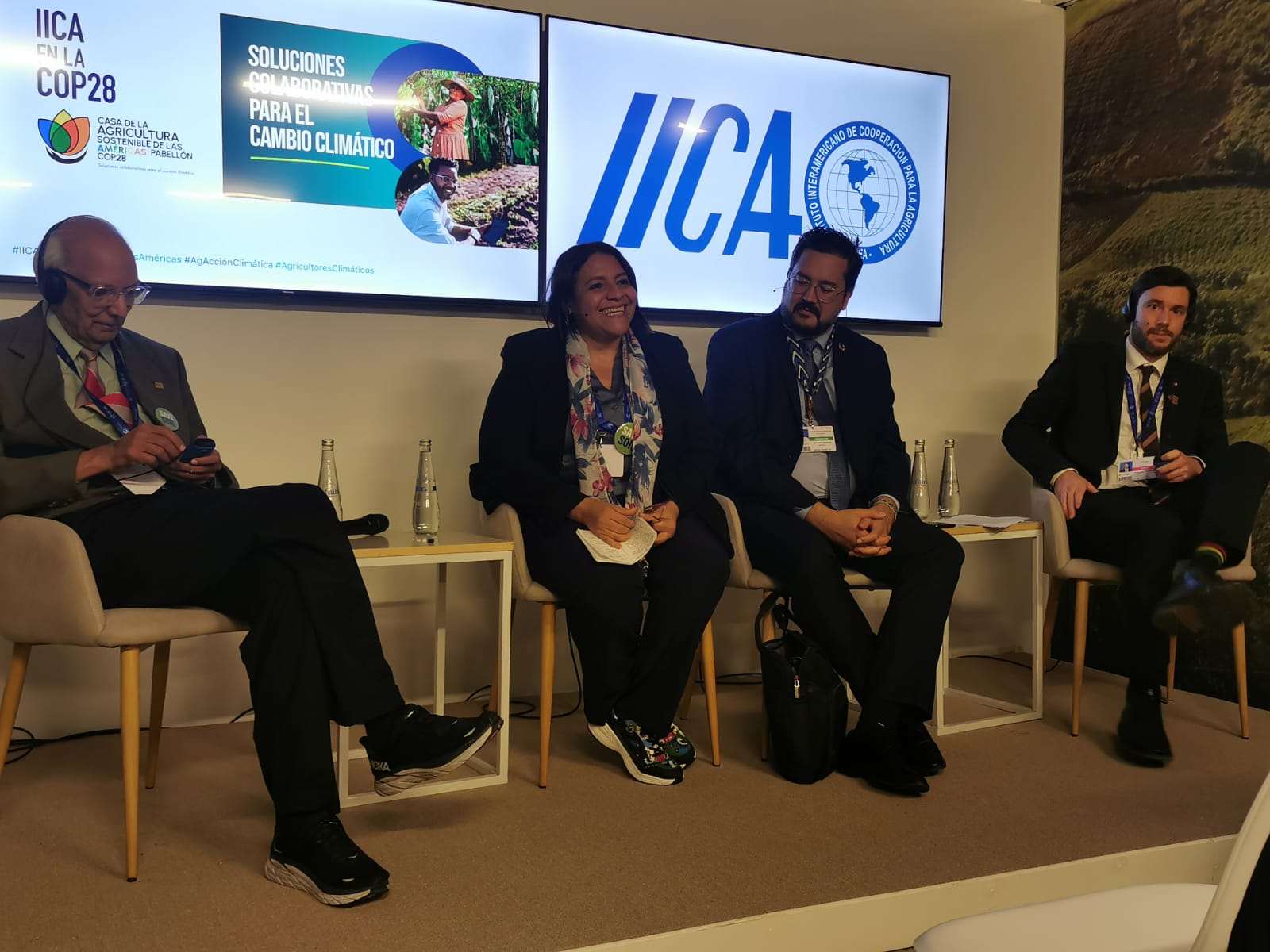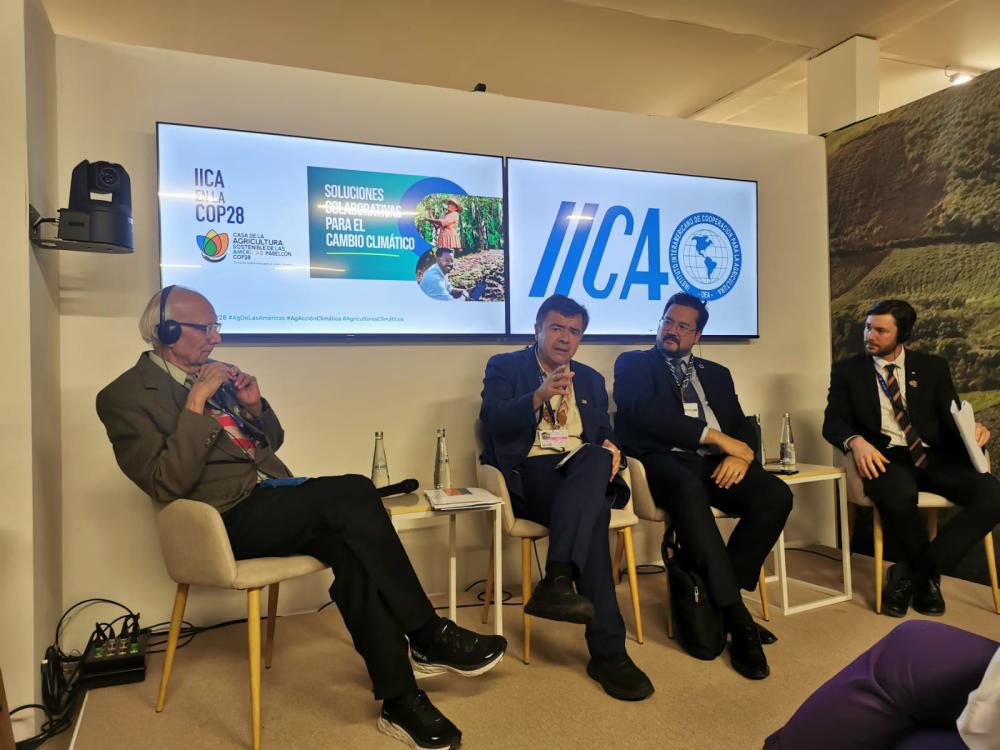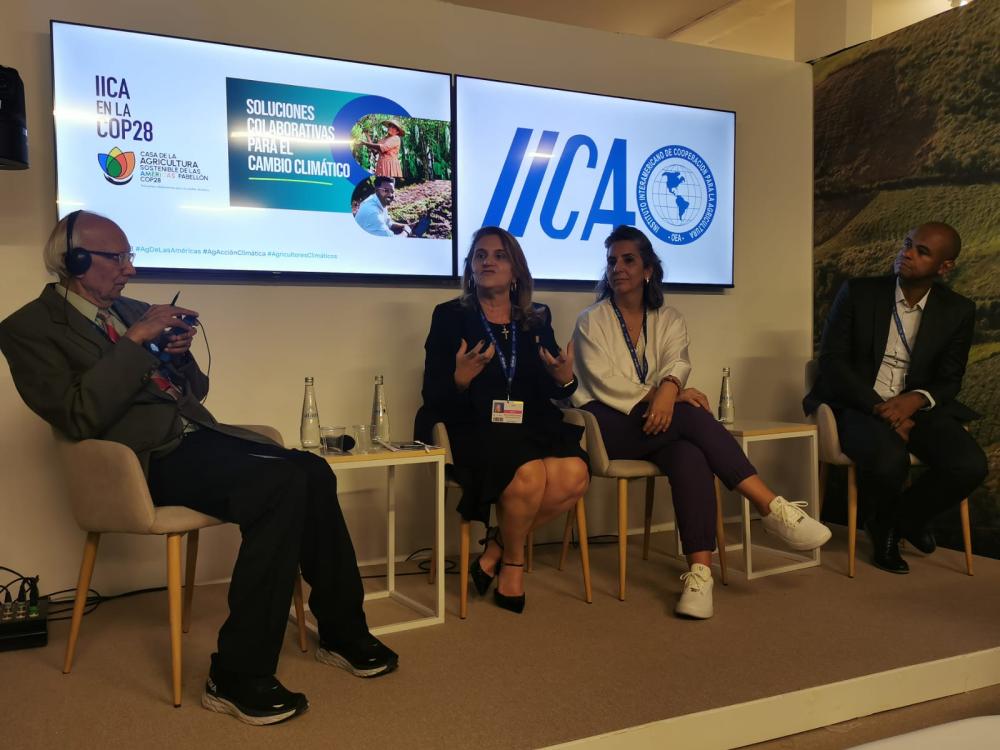At the event, details were given of the progress of the Living Soils Initiative in the Americas, carried out by IICA together with the scientist Rattan Lal, considered the world’s leading authority on the subject and one of the speakers at this event.

Dubai, United Arab Emirates, 12 December 2023 (IICA) – Agriculture of the Americas utilized the world’s major environmental discussion and negotiating forum to demonstrate that it is a key player in global food security that is increasingly embracing new practices and new technologies to enable it to sequester carbon and make an essential contribution to the fight against climate change.
The joint presentation by the private, government and scientific sectors of the Americas at the United Nations Climate Change Conference (COP28) in the United Arab Emirates was held in the pavilion organized by the Inter-American Institute for Cooperation on Agriculture, in partnership with its 34 Member States, and was the subject of much attention.
The venue, designated as the Home of Sustainable Agriculture of the Americas pavilion, has given voice to the sector at the Conference, which itself has brought together more than 70,000 people from around the world.
The presentation provided details on the latest developments in the Living Soils of the Americas initiative that IICA has spearheaded with Rattan Lal—a scientist considered to be the world’s leading authority on the topic—and who was also one of the presenters at the event. Living Soils is a combined effort by the governments, public sector and academia in the hemisphere to preserve and restore this natural resource that sustains life on the planet.
Other speakers were the ministers of Agriculture of Chile and Honduras, Esteban Valenzuela and Laura Suazo, respectively; the President of the Brazilian Agricultural Research Corporation (EMBRAPA), Silvia Massruhá; and Francois Chretién, the Director of Living Laboratories – a Canadian government initiative that champions innovation. Also participating were Mauricio Rodrigues, CEO of Bayer Latin America; Grazielle Parenti, Head of Business Sustainability for Latin America at Syngenta and Ignacio Lorenzo, from the Climate Action and Positive Biodiversity Division of CAF-Development Bank of Latin America.
“Humanity can replace fossil fuels but not agriculture”, warned Rattan Lal, who demonstrated in numbers and with concrete data how the agriculture sector of Latin America and the Caribbean has undergone a dramatic transformation since the 1960s, becoming the major net food exporting region in the world.
“That is a remarkable success story”, said the scientist, who then went on to specify that today more than 68% of the region’s soil is affected by erosion and the key action to promote soil recovery is to convert carbon into a new commodity than can generate income for farmers, much in the same way as meat and grains.

“Achieving the Sustainable Development Goals (SDGs) will only be possible if we make soil and agriculture a top priority. The Living Soils of the Americas program is working, under IICA’s leadership, to ensure that agriculture provides a carbon sink, reducing emissions and boosting productivity”, stressed Lal.
Luara Suazo pointed out that small countries with low profitability levels, such as Honduras, have a large number of subsistence farmers. “They are ecologists out of necessity because many of them don’t have the money to buy chemical fertilizers. We often mistakenly believe that soil is not a living entity, but an object; and therefore, we suffer the consequences”, she reflected.
Minister Valenzuela of Chile focused on the role of sustainable agriculture in the recovery of his country’s natural ecosystems. “Mining”, he said, “has been Chile’s primary industry and it has wreaked severe environmental damage. In previous times, agriculture expanded into hilly areas, destroying native forests, but today production is changing. A framework law on soils is being developed and there is overall consensus that we must move to a law on sustainable agroforestry. Agriculture in Chile is making its own contribution to the fight against climate change”.
EMBRAPA, hand in hand with the private sector
Other speakers were Silvia Massruhá, President of EMBRAPA; Grazielle Parenti, Head of Business Sustainability for Latin America at Syngenta; Mauricio Rodrigues, CEO of Bayer Latin America; and Ignacio Lorenzo of the Climate Financing and Positive Biodiversity Division of CAF-Development Bank of Latin America.
EMPRAPA President, Silvia Massruhá recounted the story of how Brazil became a global agrifood power, through science, innovation and the efforts of farmers.
EMBRAPA, a first-class public institution in Brazil that promotes modern and sustainable agriculture, is working on extensive agreements with both Bayer and Syngenta – two of the companies that are most involved in efforts to reduce greenhouse gas emissions and achieve carbon neutrality in the hemisphere’s agriculture sector, through soil carbon sequestration.

Grazielle Parenti of Syngenta Latin America remarked that, “Brazilian farmers are very interested in incorporating new technologies, even when they are not completely familiar with them. They all want to produce more with fewer inputs and natural resources, and therefore Brazil’s potential to offer commodities with a low carbon footprint is immense”.
“Many people speak about agriculture’s role in greenhouse gas emissions, but we must not forget that agriculture is one of the main victims of climate change and one of the few sectors that can offer solutions”.
Mauricio Rodrigues of Bayer spoke about advances in Bayer’s Pro-carbon Project with EMPRABA, which has developed a digital platform that calculates the environmental impact of sugar cane, corn and soybean production”.
In closing Rodrigues reflected that, “People must be guided by scientific information, rather than listening to the false narrative about agriculture. Therefore, it is imperative that we work on improving communication”.
More information:
Institutional Communication Division.
comunicacion.institucional@iica.in










